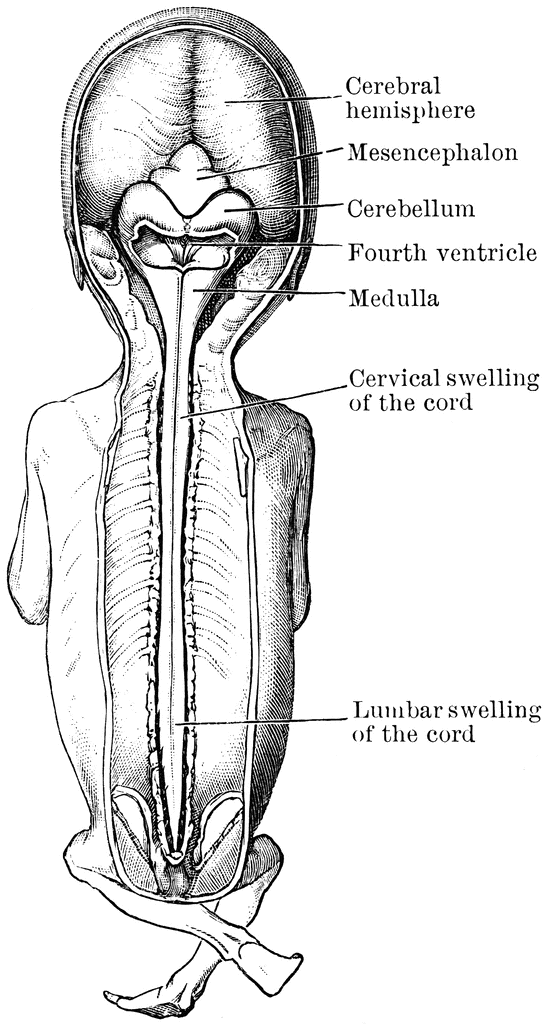
From the moment a woman conceives, the baby inside her starts developing. One of the most critical stages of fetal development is the formation of the spinal cord. The spinal cord is a thin, tube-like bundle of nerves that runs from the brainstem down to the bottom of the spine. It plays a crucial role in transmitting signals between the brain and the rest of the body. Understanding baby spinal cord development is essential for expectant mothers and healthcare professionals alike.
Table of Contents
Early Development of the Spinal Cord
The spinal cord begins to form within the first few weeks of pregnancy. During this period, the neural tube – a hollow structure that later develops into the brain and spinal cord – begins to form along the back of the embryo. As the tube grows, it eventually separates into two sections: the brain and the spinal cord.
The spinal cord develops faster than any other part of the embryo during the first month of pregnancy. By the end of this period, the spinal cord has developed into a solid mass of cells. The cells then start to divide and differentiate into different types of nerve cells.
The Importance of Proper Spinal Cord Development
The spinal cord is responsible for coordinating many of the body’s essential functions, including movement, sensation, and reflexes. Proper spinal cord development is critical to ensure that these functions operate correctly throughout the baby’s life. Any disruptions during this period can result in severe developmental problems, including spinal cord disorders like spina bifida.
Factors That Affect Baby Spinal Cord Development
Several factors can influence the development of the spinal cord during pregnancy:
- Folic acid deficiency: Folic acid is a crucial nutrient for fetal development, especially during the first few weeks of pregnancy. Lack of folic acid can lead to neural tube defects, including spina bifida.
- Maternal illnesses: Certain infections and illnesses, such as diabetes, can affect the development of the fetus, including the spinal cord.
- Medications: Some medications can harm the developing fetus, including those used to treat epilepsy.
How to Promote Healthy Spinal Cord Development
Expectant mothers can take several steps to promote healthy spinal cord development and reduce the risk of developmental problems. These include:
- Taking folic acid supplements before and during pregnancy.
- Eating a balanced diet rich in essential nutrients.
- Maintaining a healthy weight and exercising regularly.
- Avoiding risky behaviors, such as smoking and drinking alcohol.
- Getting regular prenatal check-ups to monitor the baby’s development.
Conclusion
In conclusion, baby spinal cord development is a critical stage of fetal development that requires careful attention. Proper spinal cord development is essential to ensure that the body’s essential functions operate correctly throughout the baby’s life. Mothers can take several steps to promote healthy spinal cord development and reduce the risk of developmental problems.
Frequently Asked Questions
Q: What is the spinal cord?
A: The spinal cord is a thin, tube-like bundle of nerves that runs from the brainstem down to the bottom of the spine. It plays a crucial role in transmitting signals between the brain and the rest of the body.
Q: How does the spinal cord develop?
A: The spinal cord begins to form within the first few weeks of pregnancy. During this period, the neural tube begins to form along the back of the embryo. By the end of the first month of pregnancy, the spinal cord has developed into a solid mass of cells.
Q: What factors can affect baby spinal cord development?
A: Several factors can influence the development of the spinal cord during pregnancy, including folic acid deficiency, maternal illnesses, and certain medications.
Q: How can mothers promote healthy spinal cord development?
A: Expectant mothers can take several steps to promote healthy spinal cord development, including taking folic acid supplements, eating a balanced diet, maintaining a healthy weight and exercising regularly, avoiding risky behaviors, and getting regular prenatal check-ups.
Q: What are the consequences of improper spinal cord development?
A: Improper spinal cord development can lead to severe developmental problems, including spinal cord disorders like spina bifida.
